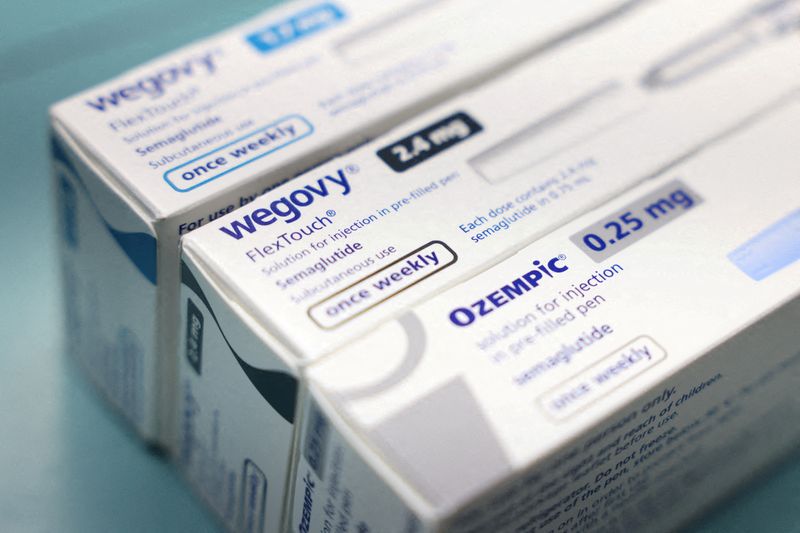Andrew Silver
SHANGHAI (Reuters) – Novo Nordisk (NYSE:) faces growing competition in the promising Chinese market, where the drugmaker is developing at least 15 generic versions of diabetes drug Ozempic and weight-loss drug Wegovy, clinical trial records show.
The Danish drugmaker has high hopes for a surge in demand for its blockbuster drug in China, which is estimated to have the highest number of overweight or obese people in the world.
Ozempic was approved in China in 2021, and Novo Nordisk doubled sales of the drug in Greater China last year to 4.8 billion Danish kroner ($698 million). Wegovy is expected to be approved this year.
However, the patent in China for semaglutide, the active ingredient of Wegovy and Ozempic, will expire in 2026.
An adverse court ruling could see it lose exclusivity on semaglutide more quickly and make China its first major market to be stripped of patent protection for the drug.
These circumstances have attracted several Chinese drugmakers to join the fray. At least 11 semaglutide drug candidates from Chinese companies are in the final stages of clinical trials, according to records in a clinical trial database reviewed by Reuters.
Karan Verma, healthcare research and data analyst at information service provider Clarivate, said: “Ozempic has achieved unprecedented success in mainland China… With the patent expiration date so close, Chinese drugmakers are looking to capitalize on this space as quickly as possible. .
Leader Hangzhou Jiuyuan Genetic Engineering has developed a treatment it says has “similar clinical efficacy and safety” to Ozempic and applied for approval for sale in April. The company has not released efficacy data and did not respond to requests for information.
The company said in January that it expected approval in the second half of 2025, but warned that the drug would not be commercialized until Novo’s patent expires in 2026, unless a Chinese court ultimately rules that the patent is invalid.
The Danish company’s semaglutide patent expires in China much earlier than in other major markets such as Japan, Europe and the United States. Term extensions won by specific regions.
More pressing for Novo is the Chinese Patent Office’s 2022 ruling that the patent was invalid for reasons related to the availability of experimental data, which the company challenged.
China’s top court said it could not say when the verdict would be ready.
A Novo spokesman said the company “welcomes healthy competition” and is awaiting a court ruling on its patent case. The spokesman did not respond to follow-up inquiries for this story.
Other Chinese drugmakers in the final stages of clinical trials of generic versions of Ozempic include United Lab, CSPC Pharmaceutical Group, Huadong Medicine and subsidiaries of Sihuan Pharmaceutical Holdings Group.
CSPC said in May it expected approval of its diabetes drug semaglutide in 2026.
In an October report, brokerage Jefferies predicted that United Lab’s semaglutide drug would be launched in 2025 for the treatment of diabetes and in 2027.
Impact on price
According to a 2020 study by Chinese public health researchers, the number of overweight or obese adults in China is expected to reach 540 million and 150 million respectively by 2030, which are 2.8 and 7.5 times the 2000 levels respectively.
Analysts say if Chinese drugmakers’ products prove to be as safe and effective as Novo Nordisk’s, it will increase competition and lower prices.
Goldman Sachs analysts estimated in an August report that generic drugs could cause the price of semaglutide to drop by about 25% in China. Clarivate’s Verma said a weekly injection of Ozempic through China’s public hospital network would cost about $100 per 3 milliliters.
Novo acknowledged the increase in competition.
Novo executive vice president Maziar Mike Doustdar told investors in March that “we may see more players emerge in 2026 and 2027 due to ongoing clinical trials,” referring to the Chinese market.
But he also questioned the ability of some players to provide meaningful volume, adding “we’ll see it as we get closer”.
Novo also faces competition from established international companies, including Eli Lilly (NYSE: ), whose diabetes drug Mounjaro was approved in China in May. HSBC analysts expect China to approve Eli Lilly’s weight-loss drug with the same active ingredient this year or in the first half of 2025.
Eli Lilly did not respond to a request for comment on China’s approval of the drug, which is known as Zepbound in the United States.
Supply from Wegovy and Zepbound remains constrained, but both companies have been increasing production.

Zuo Yajun, general manager of Shanghai Benema Pharmaceutical Co., Ltd., a manufacturer of slimming pills, said the competitiveness of a product depends on its unique features, such as efficacy, durability of treatment and the company’s sales ability.
“It’s going to be a competitive market, but it’s hard to say who will be (the leader),” she said.

